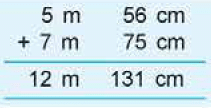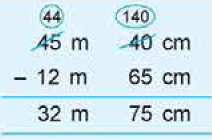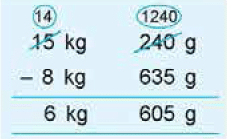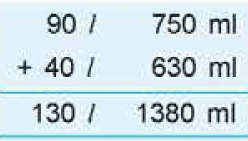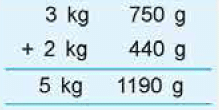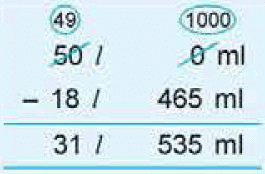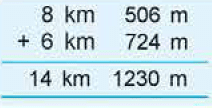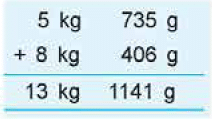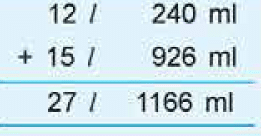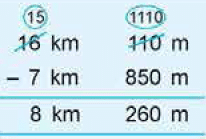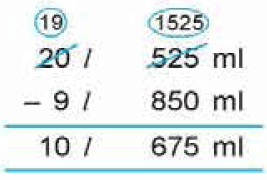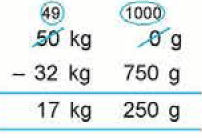Class 4 Maths - Measurement - Question Answers
Question 1: Express as millimetres:
(a) 15 cm
We know that 1 cm = 10 mm.
So, 15 cm = 15 x 10 = 150 mm.
(b) 26 cm 5 mm
We know that 1 cm = 10 mm.
So, 26 cm 5 mm = 26 x 10 mm + 5 mm.
= 260 mm + 5 mm = 265 mm.
Question 2: Express as m and cm:
(a) 512 cm
We know that 100 cm = 1 m
So, 1 cm = 1/100 m.512 cm = 500 cm + 12 cm
= 500/100 m + 12 cm.
= 5 m 12 cm.
(b) 4,015 cm
4,015 cm = 4,000 cm + 15 cm
= 4,000/10 m + 15
= 40 m 15 cm
Question 3: Add 5 m 56 cm and 7 m 75 cm.
12 m 131 cm = 12 m + 100 cm + 31 cm
= 12 m + 1 m + 31 cm
= 13 m 31 cm. [Since 100 cm = 1 m]
Question 4: Subtract 12 m 65 cm from 45 m 40 cm.
Here 40 cm < 65 cm.
So, regroup 45 m as 44 m + 100 em.
Thus 100 cm + 40 cm = 140 cm
Now 140 cm - 65 cm = 75 cm
Write 75 in the cm column.
Finally 44 m - 12 m = 32 m.
Write 32 in the m column.
Question 5: Subtract 8 kg 635 g from 15 kg 240 g
Here 240 g < 635 g. So regroup
15 kg as 14 kg + 1, 0 00 g.
Thus, 1,000 g + 240 g = 1,240 g.
Also, 1,240 g - 635 g = 605 g.
Finally, 14 kg - 8 kg = 6 kg.
Question 6: Express as 1 and ml:
(a) 1,678 ml
1,678 ml = 1,000 ml + 678 ml = 1 l + 678 ml = 1 l 678 ml.
(b) 4,360 ml
4,360 ml = 4,000 ml + 360 ml
= 4 l + 360 ml
= 4 l 360 ml.
(c) 15,047 ml
15,047 ml = 15,000 ml + 47 ml
= 15 l + 47 ml (·.· 1000 ml = 1 l)
= 15 l 47 ml.
Question 7: A tank contained 90 l 750 ml of water. 40 l 630 ml more water was poured into it. Find the quantity of water in the tank.
Quantity of water in the tank = 90 l 750 ml
Quantity of water poured into it = 40 l 630 ml
Total quantity of water in the tank
= 90 l 750 ml + 40 l 630 ml
130 l 1380 ml = 130 l + 1,000 ml + 380 ml
= 130 l + 1 l + 380 ml
= 131 l 380 mlHence, total quantity of water in the tank = 131 l 380 ml.
Question 8: Change to centimetres:
(a) 4 m
We know that 1 m = 100 cm.
So, 4 m = 4 x 100 cm = 400 cm.
(b) 7 dm
We know that 1 dm = 10 cm.
So, 7 dm = 7 x 10 cm = 70 cm.
(c) 3m 4 dm
Also, 3 m 4 dm = 3 x 100 cm + 4 x 10 cm
(d) 2 m 5 dm 6 cm
2 m 5 dm 6 cm = 2 x 100cm + 5 x 10 cm + 6 cm
= 200 cm + 50 cm + 6 cm = 256 cm
(e) 8 dm 3 cm
8 dm 3 cm = 8 x 10 cm + 3 cm
= 80 cm + 3 cm = 83 cm
Question 9: Express as cm and mm:
(a) 75 mm
We know that 10 mm = 1 cm
So 1 mm = 1/10 cm.
75 mm = 70 mm + 5 mm
= 70/10 cm + 5mm.= 7 cm 5 mm
(b) 109 mm
109 mm = 100 mm + 9 mm
= 100/10 cm + 9 mm.= 10 cm 9mm.
Question 10: Express as grams:
(a) 5 kg
We know that 1 kg = 1,000 g. So,
5 kg = 5 x 1,000 g = 5,000 g.
(b) 12 kg
12 kg = 12 X 1,000 g = 12,000 g.
(c) 8 kg 360 g
8 kg 360 g = 8 kg + 360 g = 8 x 1,000 g + 360 g
= 8,000 g + 360 g = 8,360 g.
Question 11: Mamta's bag weighed 3 kg 750 g and Sushma's bag weighed 2 kg 440 g.
Weight of Mamta's bag = 3 kg 750 g
Weight of Sushma's bag = 2 kg 440 g
Weight of both the bags = 3 kg 750 g + 2 kg 440 g
Now, 5 kg 1,190 g = 5 kg + 1,000 g + 190 g
= 5 kg + 1 kg + 190 g = 6 kg 190 g
Hence, weight of both the bags = 6 kg 190 g.
Question 12: Subtract 18 l 465 ml from 50 l.
Here, 0 ml < 465 ml.
So, regroup 50 l as
49 l + 1,000 ml.
Also, 1,000 ml + 0 ml = 1,000 ml
So, 1,000 ml - 465 ml = 535 ml.
Finally, 49 l - 18 l = 31 l.
Question 13: Express as metres:
(a) 18 km
We know that 1 km = 1,000 m.
So,18 km = 18 x 1,000 m = 18,000 m
(b) 62 km 305 m
We know that 1 km = 1,000 m.
So, 62 km 305 m = 62 x 1,000 m + 305 m
= 62,000 m + 305 m = 62,305 m
Question 14: Add 8 km 506 m and 6 km 724 m
14 km 1230 m = 14 km + 1,000 m + 230 m
= 14 km + 1 km + 230 m
= 15 km 230 m. [Since 1,000 m = 1 km]
Question 15: Add 5 kg 735 g and 8 kg 406 g
13 kg 1141 g = 13 kg + 1,000 g + 141 g
= 13 kg + 1 kg + 141 g
= 14 kg 141 g.
Question 16: Add 12 l 240 ml and 15 l 926 ml
We have : 12 l 240 ml + 15 l 926 ml = 27 l 1166 ml
27 l 1166 ml = 27 l + 1,000 ml + 166 ml
= 27 l + 1 l + 166 ml
= 28 l 166 ml. [Since 1,000 ml = 11]
Question 17: Subtract 7 km 850 m from 16 km 110 m.
Here 110 m < 850 m.
So, regroup 16 km as 15 km + 1000 m.
1,000 m + 110m = 1,110 m.
Now 1,110 m - 850 m = 260m
Write 260 in the metres column.
Finally 15 km- 7 km = 8 km.
Write 8 in the km column.
Question 18: A bucket contains 20 l 525 ml of water. Another bucket contains 9 l 850 ml of water. How much more water does the first bucket contain?
Quantity of water in the first bucket = 20 l 525 ml
Quantity of water in the second bucket = 9 l 850 ml
Difference of the capacities =
Hence, the first bucket contains 10 l 675 ml of water more than the second.
Question 19: Express as kg and g.
(a) 1,080 g
1,080 g = 1,000 g + 80 g
= 1 kg + 80 g [Since 1,000 g = 1 kg]
= 1 kg 80 g.
(b) 2,304 g
2,304 g = 2,000 g + 304 g
= 2 kg+ 304 g [Since 1,000 g = 1 kg]
= 2 kg 304 g.
(c) 25,360 g
25,360 g = 25,000 g + 360 g
= 25 kg + 360 g [Since 1,000 g = 1 kg]
= 25 kg 360 g.
Question 20: Express as ml:
(a) 4 l
We know that 1 l = 1,000 ml
(a) 4 l = 4 x 1,000 ml = 4,000 ml.
(b) 18 l
18 l = 18 x 1,000 ml = 18,000 ml.
(c) 9 l 405 ml
9 l 405 ml = 9 l + 405 ml = 9 x 1,000 ml + 405 ml
= 9,000 ml + 405 ml = 9,405 ml.
Question 21: Express as km and m:
(a) 1,408 m
We know that 1,000 m = 1 km
So, 1 m = 1/1,000 km.
1,408 m = 1,000 m + 408 m
1,000/1,000 km + 408 m.
= 1 km 408 m
(b) 12,576 m
12,576 m = 12,000 m + 576 m
12,000/1,000 km + 576 m = 12 km 576 m.
Question 22: A man bought 50 kg of rice for his family for a month. Out of this the quantity of rice that got spent was 32 kg 750 g. What quantity of rice was left?
Quantity of rice bought = 50 kg 0 g.
Quantity of rice consumed = 32 kg 750 g
Hence, quantity of rice left = 17 kg 250 g.
|
33 videos|168 docs|30 tests
|
FAQs on Class 4 Maths - Measurement - Question Answers
| 1. What is measurement and why is it important? |  |
| 2. What are the different types of measurement scales? |  |
| 3. How do you convert between different units of measurement? |  |
| 4. What are the common tools used for measurement? |  |
| 5. How can measurement errors be minimized? |  |

